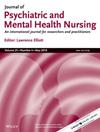Safeguarding Experiences of People in Mental Distress, Police and Healthcare Practitioners: An Integrative Review
Abstract
Introduction
Globally, there is demand on police and emergency health services to respond to people in mental distress. Research at this intersect has focused on decriminalisation of people with severe mental health disorders, police custody care or interagency collaborative models. There is little understanding of the experiences of stakeholders where mental distress is not associated with a severe mental disorder or criminal offence.
Aim
To determine current knowledge about safeguarding of people in mental distress supported by police and healthcare practitioners.
Method
A rigorous integrative review with 10 databases was searched January 2002 to January 2024.
Results
The search filtered 12,451 titles and abstracts with 41 full-text articles appraised. Three overarching themes emerged: Safeguarding and care experiences of people in mental distress; intoxication, self-harm and aggression; professional perspectives and responses to people in mental distress.
Discussion
Experiences are varied. Whilst there is evidence of compassion, many reported negative experiences when self-harm and intoxication are involved, inconsistent professional responses and gaps in emergency police and mental health systems.
Implications for Practice
Unscheduled care and community mental health nurses have a vital role to play in identifying and influencing interdisciplinary gaps in out-of-hours emergency health and police processes to support people in mental distress to prevent repetitive distress cycles. This calls for an urgent re-imagining of unscheduled care mental health pathways, Specifically, where practice gaps impact on people who are intoxicated yet do not require inpatient care.
Relevance to Mental Health Nursing (for Peer Reviewers and Editors Only)
People in mental distress (PiMD) who come to police attention often require an interdisciplinary response. Unscheduled care and community mental health nurses play a key role in this support. This integrative review suggests there are systems gaps and variety in mental health and policing practice for PiMD, particularly for those who are intoxicated and/or who do not need inpatient care. Some PiMD experience cyclical, and at times, undignified and unsafe care. These gaps should be addressed through service redesign and sharing of evidence across disciplines whilst listening to and responding to perspectives of those experiencing mental distress in our communities.


 求助内容:
求助内容: 应助结果提醒方式:
应助结果提醒方式:


